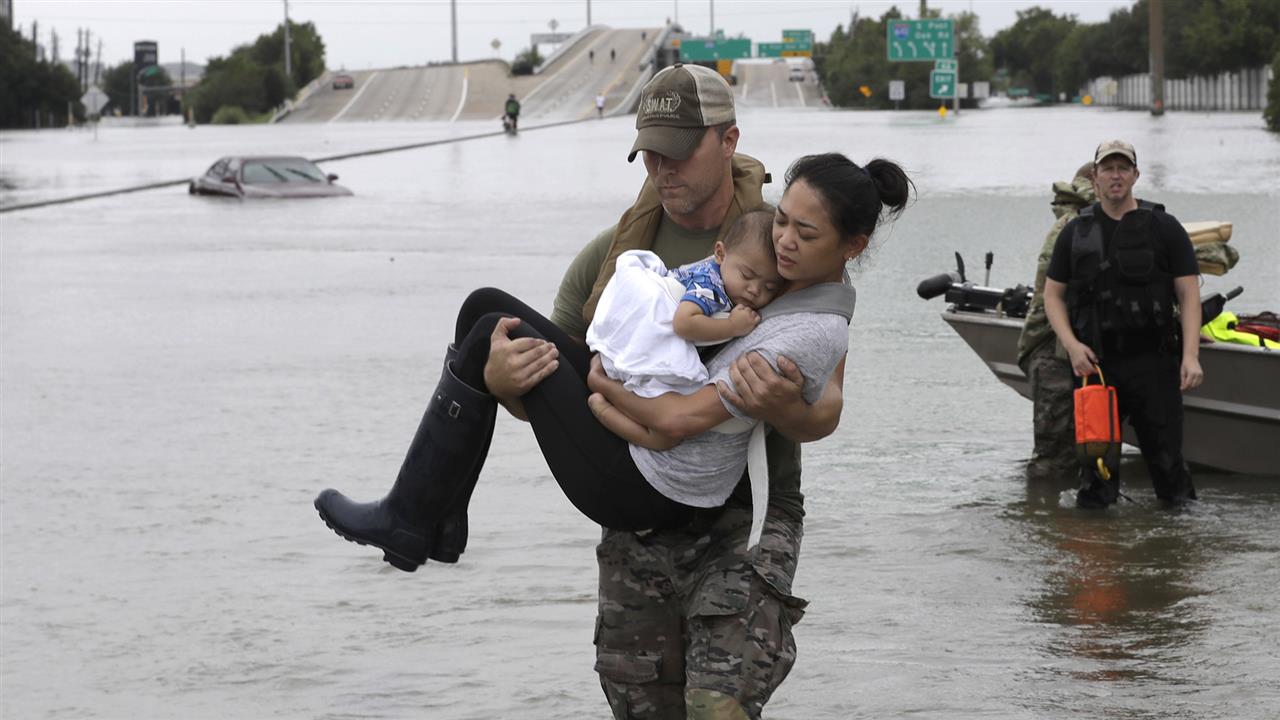When we lived in the U.S., Renee and I went to see a musical based on the story of Noah (The tickets were free. Trust me, I would have preferred a movie). It was a lively, toe-tapping evening of divine wrath and human misery. Yes, outside the walls of the ark, God was choking the life out of men, women and children, but inside, Noah and his family of eight were singing and dancing the days of torrential rains and cataclysmic flooding away. And let me tell you, I never realised Noah was such hot shit on the dance floor.

When modern mega-storms and major floods (or any other natural disasters) occur, such as Hurricane Harvey, or Hurricane Katrina in 2005, a temptation arises to see them as heaven’s punishment for sin, or a relaxed moral attitude toward sexuality. That portrays God as the trigger man, angrily marking out a city or a group of people for retribution and spinning his Wheel of Terrestrial Mayhem to decide which ‘act of God’ will spell their demise.
*Sigh*. Let’s get the obvious stuff out of the way first. Hurricanes form over water and draw their energy from the ocean. They hit coastal areas like New Orleans and Houston because, well, they’re coastal areas. In spite of this, many persist in believing that he’s behind the curtain, turning dials and pulling levers, spinning out hurricanes and flooding cities to mete out judgement. Hey, he’s got an Old Testament track record of leaving the taps on, right?
Maybe some of us gravitate to the more sombre vignettes of God from the Hebrew scriptures because in them, he behaves the way we want him to. He despises the same people we do and he stands ready to dole out vengeance on them for wronging us or for breaking the rules. He sanctions our wars or other violence against our enemies. He gives everyone what we believe they deserve.
But if you’re someone who finds this idea of God monstrous and frightening, even abhorrent, then there’s good news for you. It comes from the Fourth Gospel, the conclusion to the beautiful, sweeping prologue to the book:
“No one has ever seen God. It is God the only Son, who is [in] the Father’s heart, who has made him known.”
John 1:18, NRSV
The writer makes two astounding statements here and we should take the time we need to reflect on them. First, he’s saying that no one – not Abraham, not Moses, not the prophets, not the writers of the Hebrew scriptures – no one has ever truly understood God or what God is really like.¹
That perhaps helps us to recognise that, living within times of perpetual warfare, violence, oppression and vengeance, they saw God as what they wanted or needed God to be. They saw God very much as we often do.²
The gospel writer’s second assertion is that it’s Jesus who shows us what God is actually like.
And that’s the good news! Because in Jesus, we see a God who heals, not a God who destroys. We see a God who calms storms, not one who sends them in judgement. We see a God who offers peace instead of violence. We see a God who sacrifices himself for everyone, including his enemies. In Jesus, we see a God who refuses to call down divine vengeance and retribution on his opponents, but instead prays for divine forgiveness.
Sadly, some actually prefer the Old Testament God to the New Testament one. The New Testament God seems to go too easy on evildoers and enemies. This God loves when they want him to denounce. This God forgives when they want him to condemn. This God surrenders his life when they want him to stand up and fight back.
But for the rest of us, we can find hope in the fresh picture of God, the ultimate revelation found in Jesus. As God in the flesh, he understands our joys, struggles and suffering.
That’s especially true in the face of today’s natural disasters. The God revealed in Jesus doesn’t hurl lightning or spit relentless rain upon humanity, selecting a few for salvation on a floating karaoke hall. No, he weeps with those who have lost everything and rejoices when his people extend compassion toward them.
¹ This is not a Christian author somehow mocking Hebrew scribes. We can be certain that the writer of the Fourth Gospel is himself Jewish. The prologue, though written in Greek, is a poem in a Hebrew style. Beyond that, the writer has an in-depth knowledge of Jewish customs and festivals, as well as the geography of Jerusalem, and demonstrates a profound respect for the Hebrew scriptures throughout the book.
² Interestingly, Jewish friends I’ve spoken with in the past have no trouble recognising this point. They are keenly aware that in the Law and the Prophets, we see a people developing their understanding of God – and not always getting it right.
Image Credits:
- Feature Image: Flood rescue effort from Houston area, from the Wall Street Journal (https://www.wsj.com/articles/u-s-s-largest-refinery-shuts-due-to-harvey-flooding-1504097098)
- Noah dancing (From Sight and Sound Theatres production of Noah: The Musical)


Leave a Reply